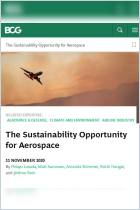
Read or listen offline
Recommendation
The pandemic was no picnic for the aviation industry, but even before COVID-19 travel restrictions came on the scene, there was plenty of trouble to consider. Customers, employees, shareholders, and most importantly, policy makers have been clamoring for lower carbon emissions for decades. When an industry’s product is carbon-heavy transportation, how do you reduce its carbon footprint without removing the product entirely? Experts from the Boston Consulting Group explore climate-friendly aviation options in this special report, but don’t get too excited – none of them are close to widespread adoption.
Take-Aways
About the Authors
Ryah Whalen, Thomas Eisenhart, Adam Gordon, Michael Deimler, Pelayo Losada and Clint Follette are professionals with the Boston Consulting Group.


















Comment on this summary or 开始讨论